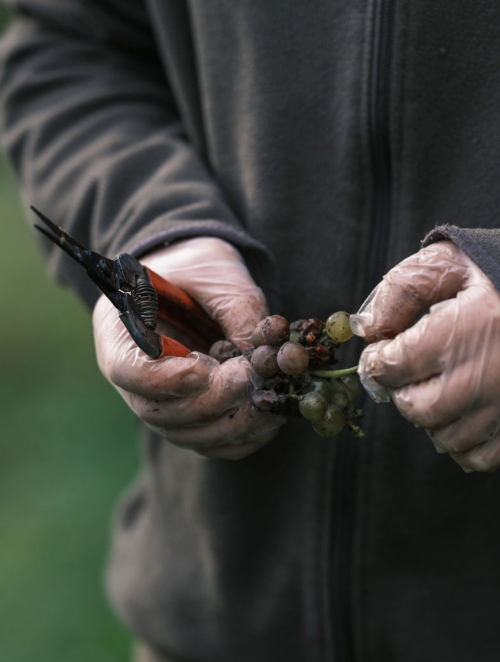
A unique experience for true wine connoisseurs!
Noble sweet Saar wines have enjoyed a legendary reputation in the wine world for centuries. From opulent exotic late-harvest and selected wines to rich berry and dried-berry selections, and even the legendary ice wines, these wines possess unique aging potential.
There are basically five types of noble sweet Saar wines: Noble sweet late harvests are ideally made from fully ripe, golden-yellow grapes, whose precise, exotic fruit aromas can also be found in the later wine. Selected grapes, on the other hand, are harvested from overripe and rotten grapes that have been affected by a noble rot fungus called "Botrytis cinerea". In foggy autumn weather, the noble fungus attacks the grapes and perforates the skin, allowing water to evaporate and the aromas to concentrate. This gives these wines a rich aroma and silky texture. Selected berries are prepared from individual, already dried-up rotten grapes. These wines have an oily texture and are particularly aromatic. The crowning glory of noble sweet wines from Botrytis grapes are the dried-berry selections, selections from completely dried grapes. These are laboriously selected by hand from the remaining grapes and then painstakingly pressed for hours to extract a few drops of their golden-yellow juice from the raisins. These wines have both very high sweetness and very high concentration and acidity and, due to these properties, can easily survive a human lifetime. Ice wines are a very special rarity, which can only rarely be produced in Germany in times of climate change. Ideally, ripe and completely healthy grapes are frozen-harvested and pressed at a temperature of at least -7°C. The resulting wine is characterized by its brilliantly fruity aroma with refreshing acidity.
Order the fine, sweet Saar wines from our top winemakers at winemaker prices from us below.
A unique experience for true wine connoisseurs!
Noble sweet Saar wines have enjoyed a legendary reputation in the wine world for centuries. From opulent exotic late-harvest and selected wines to rich berry and dried-berry selections, and even the legendary ice wines, these wines possess unique aging potential.
There are basically five types of noble sweet Saar wines: Noble sweet late harvests are ideally made from fully ripe, golden-yellow grapes, whose precise, exotic fruit aromas can also be found in the later wine. Selected grapes, on the other hand, are harvested from overripe and rotten grapes that have been affected by a noble rot fungus called "Botrytis cinerea". In foggy autumn weather, the noble fungus attacks the grapes and perforates the skin, allowing water to evaporate and the aromas to concentrate. This gives these wines a rich aroma and silky texture. Selected berries are prepared from individual, already dried-up rotten grapes. These wines have an oily texture and are particularly aromatic. The crowning glory of noble sweet wines from Botrytis grapes are the dried-berry selections, selections from completely dried grapes. These are laboriously selected by hand from the remaining grapes and then painstakingly pressed for hours to extract a few drops of their golden-yellow juice from the raisins. These wines have both very high sweetness and very high concentration and acidity and, due to these properties, can easily survive a human lifetime. Ice wines are a very special rarity, which can only rarely be produced in Germany in times of climate change. Ideally, ripe and completely healthy grapes are frozen-harvested and pressed at a temperature of at least -7°C. The resulting wine is characterized by its brilliantly fruity aroma with refreshing acidity.
Order the fine, sweet Saar wines from our top winemakers at winemaker prices from us below.
last seen
achieve their sweetness in different ways. One of the sweetest wines is ice wine, which is made from grapes that have frozen on the vine. This icy harvest leads to a high concentration of sugar and aromas, giving the wine an outstanding sweetness. Selected dry berries (TBA) are also known for their exceptional sweetness. Here, only individual berries affected by noble rot are used, leading to an intense concentration of sugar and aromas. Port wine, a fortified wine from the Portuguese Douro region, also offers a sweet option. Here, the fermentation process is stopped by adding brandy, resulting in a higher residual sugar content. Lovers of very sweet wines should also take a look at the noble sweet Rieslings from the Saar or Sauternes from Bordeaux. These wines are characterized by their intense sweetness and complex aromas. Overall, very sweet wines offer a wide range of taste experiences and are particularly well-suited as a crowning finale to a delicious dinner or as an accompaniment to sweet desserts.
 Delivery time 2-3 working days
Delivery time 2-3 working days Saar wines at winemaker prices
Saar wines at winemaker prices Largest Saar wine range on the web
Largest Saar wine range on the web Advice: 0176 638 92254
Advice: 0176 638 92254












